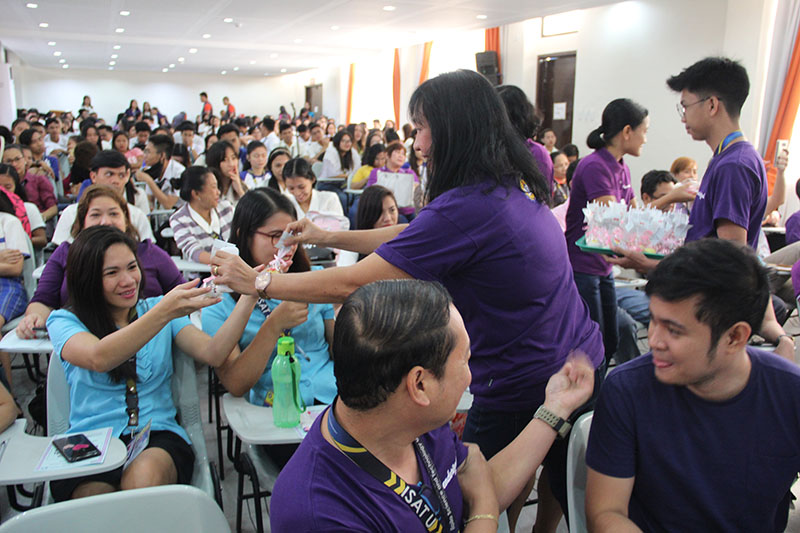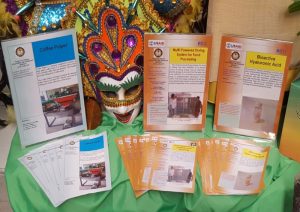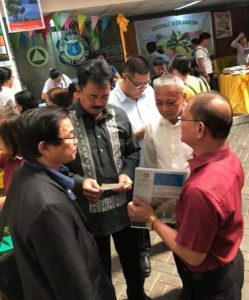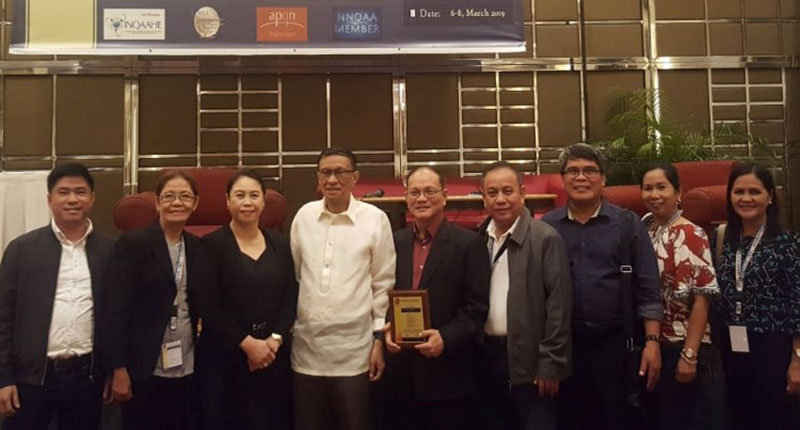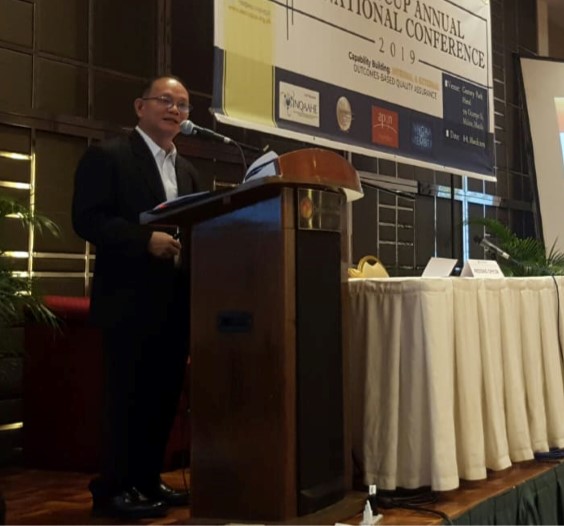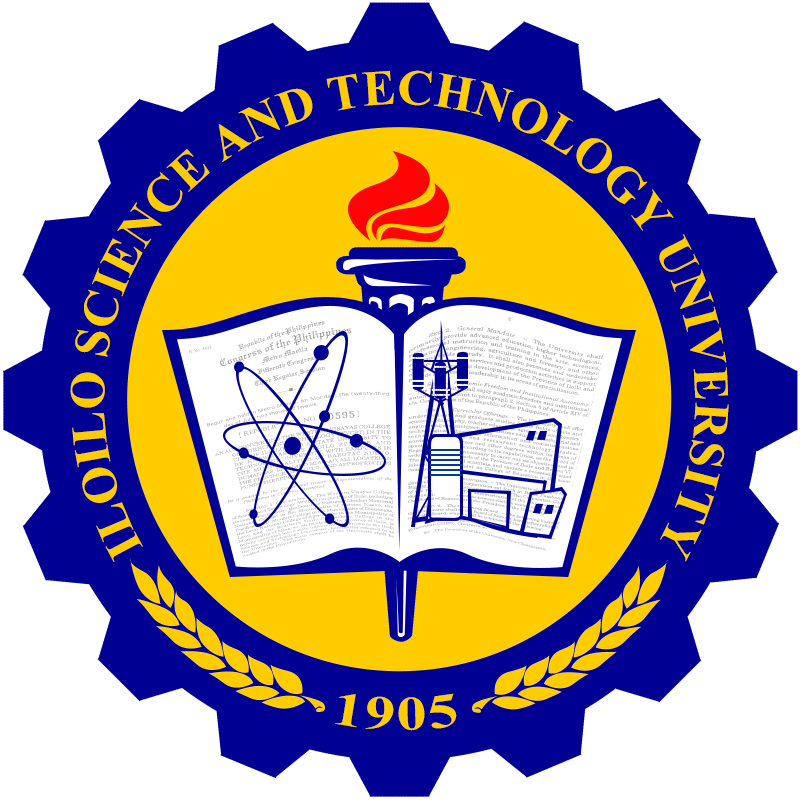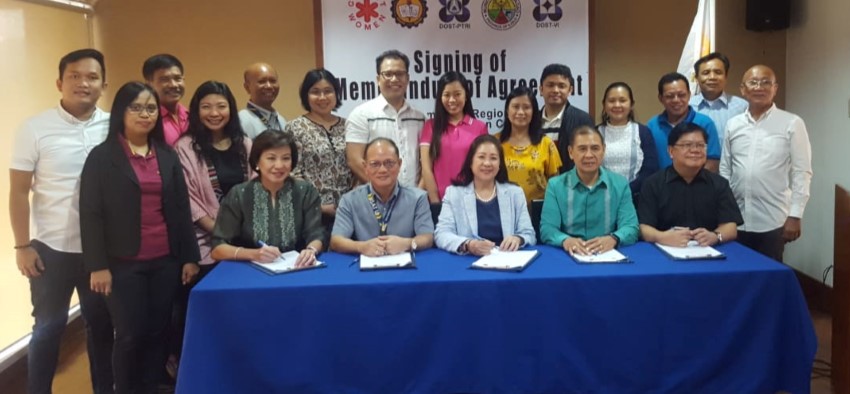
A memorandum of agreement (MOA) for the establishment of the P41.57-million Regional Yarn Production and Innovation Center (RYPIC) was signed by (seated , L-R) Great Women Philippines Corporation President Jeannie Javelosa, Iloilo Science and Technology University (ISAT U) President Dr. Raul F. Muyong, Philippine Textile Research Institute (PTRI) Director Celia Elumba, Miagao Mayor Macario Napulan, and Department of Science and Technology (DOST-6) Director Rowen Gelonga .
Designed to revive and to develop the hand-loom weaving (hablon) and fiber industry, the country’s first Regional Yarn Production and Innovation Center (RYPIC) will soon emerge at Iloilo Science and Technology University (ISAT U).
The Memorandum of Agreement for the launching of the PHP 41.57 million facility was signed by ISAT U, Department of Science and Technology (DOST), DOST-Philippine Textile Research Institute (PTRI), the Municipality of Miagao, and the Iloilo Greatwomen Philippines Corporation (GWPhC) at ISAT U Miagao Campus on March 8, 2019.
Hand-loom weaving has been part of Miagao’s cultural and historical heritage. The once thriving hand-loom weaving in the region dates back in the 18th century. Mayor Macario Napulan recalled that Miagao was the center for the handwoven textile and there were almost 4,000 looms in the municipality then.
However, the migration of workers to the sugar industry in Negros and the availability of ready-to-wear caused the decline of the industry.
Ms. Celia Elumba, PTRI Director, explained how the project was formed. “We didn’t start with a concept, thinking that it is simply prototyping. Meaning we really insisted that this is going to be production and innovation. It was produced to fuel an industry,” she said.
On her visit at ISAT U on July 28 last year, Ms. Elumba said that fabrics made of indigenous materials and woven the traditional way are high-priced. “Hand woven-fabrics are more expensive, especially abroad, if made of native materials such as cotton, abaca or pineapple fibers” she explained. Giving importance to its social, economic, ecological and sustainability components, she also emphasized the use of dyes from local plants and materials that add value to the fabric. PTRI, the premier textile research and development arm of the DOST, set the goal of producing purely and uniquely Filipino products.
ISAT U’s challenges on research and development
Considering its thrust on research and development, ISAT U will act as Chief Coordinator among the parties. Aside from the production facility at Miagao Campus, the Iloilo City Campus will provide expertise in science, engineering and technology for the development of natural dyes and materials and for prototyping the loom machines.
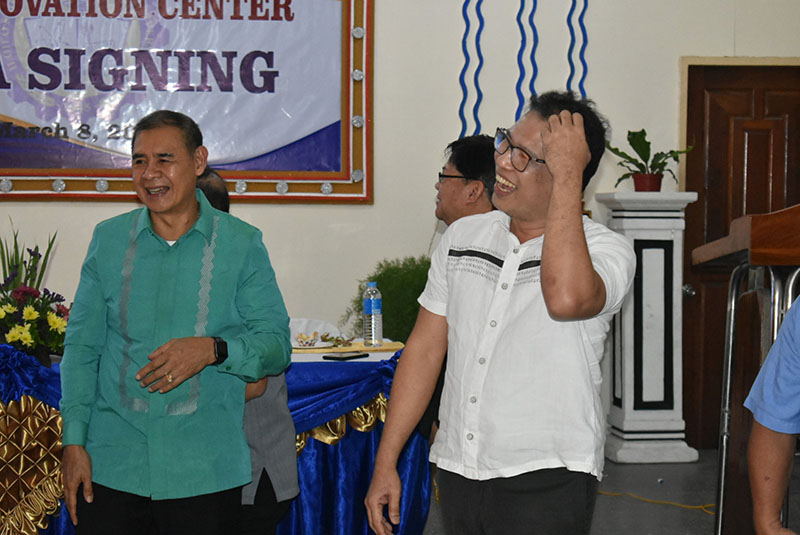
Dr. Carmelo V. Ambut (right) enjoys the moment with Miagao Mayor Macario Napulan after the MOA signing at ISAT U Miagao Campus.
Dr. Carmelo V. Ambut, ISAT U Vice President for Research and Extension Services, said that the University is challenged to create distinct and unique blends of cotton with other local fibers. “There are a lot of plants, like bamboo, that could be potential source of fibers. In research, everything is possible,” he said.
“We will also conduct ethnobotanical researches, cultivate and propagate raw fabric materials that was never used before. We will also develop equipment for pre-treatment, degumming and spinning to speed up production.” Dr. Ambut added.
He also divulged a plan of creating a “power loom” for mass production of indigenous fabrics. “Power looms will be used for mass production of polyester-free fabric and reduces the use of plastic. This contributes to environmental concerns.” He also negates the effect of power loom to hand-loom weaving. “Hablon produce by hand-loom will maintain its prestige and value since it is considered as special fabric and is not mass produced, “ Dr. Ambut explained.
A textile village is also envisioned to propel economy and boost the municipality’s tourism. This features a mini museum showcasing the hablon’s evolution, a training center and hands-on facility in hablon-making and a souvenir shop.
The University considers Dumangas and Leon Campuses’ potentials for cultivating raw materials. ISAT U President Dr. Raul F. Muyong said that the 85-hectare property in Brgy. Aglalana, Passi City will be developed to produce pineapples to be able to “supply the requirements of the center, both for production purposes of textiles and for research and development.”
Through the project, Dr. Muyong is also looking at the opportunity to open new programs on weaving and the fabric industry. The board has been discussing about opening a Certificate in Textile Technology that will train students on the textile process, later, Diploma in Textile Technology where research in natural fiber will be developed and the Bachelor of Science in Textile Technology to produce manpower.
He is optimistic that the center will bring back the interest of students in weaving. “ISAT U used to offer weaving as one of the electives sa girls trade but as the time goes, wala na sang nagka-interest, thus nagdeteriorate ang ila looms. But I hope that with this, we will be able to integrate into curriculum this program and bring back their interest,” said Dr. Muyong.
RYPIC and its impact to research, industry and economy
Engr. Rowen R. Gelonga, DOST RO6 Director, emphasized the importance of the yarn center. “This is one of the biggest facilities in terms of yarn production outside of PTRI. This is the first in the country. This will now be the basis for any possible subsequent projects in other parts of the Philippines,” he said.

The University key officials, representatives from different partner agencies dance and sing to show their full cooperation to the project.
Gelonga added that 29 million of the 41.57 million peso budget will be used for the equipment and the remaining for the supply and materials. The project will have 9 equipment and ancillaries for fiber pre-treatment and 18 for yarn production.
The project is also expected to strengthen research and development. “Our facility can be used by researchers and scientists to produce more technologies. They can experiment new types of yarns, although we are now focused on cotton,” said Engr. Gelonga.
On the same note, Dr. Muyong said that, “this will give opportunity to ISAT U to improve its research culture because we are the only science and technology university in the region. Our role in research development is very important.”
As to its impact to the community, Engr. Gelonga cited the benefits of the project to the locals. He stressed that “we can be able to localize everything, we can plant our own cotton, we can produce our own thread and yarns and give it to our weavers, so more people can benefit.”
Mayor Macario Napulan said that the project is a big lift to the town’s hablon-making industry and could spur development in the country’s textile industry. “The regional center is an improvement not only in the weaving industry textile production in Maigao but also in the country, “he said. In 2013, Napulan started reviving the industry with only 50 weavers left and the number increased by 200.
Considering the sustainability of the project and the marketability of the products, the GWPhC in close coordination with the University will oversee the implementation of the project. At the lapse of the two-year period of the Agreement, it will take over the ownership and operation of the RYPIC.
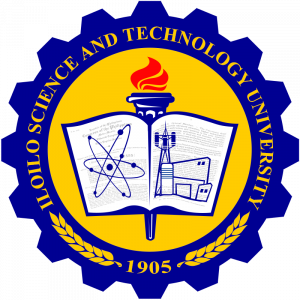

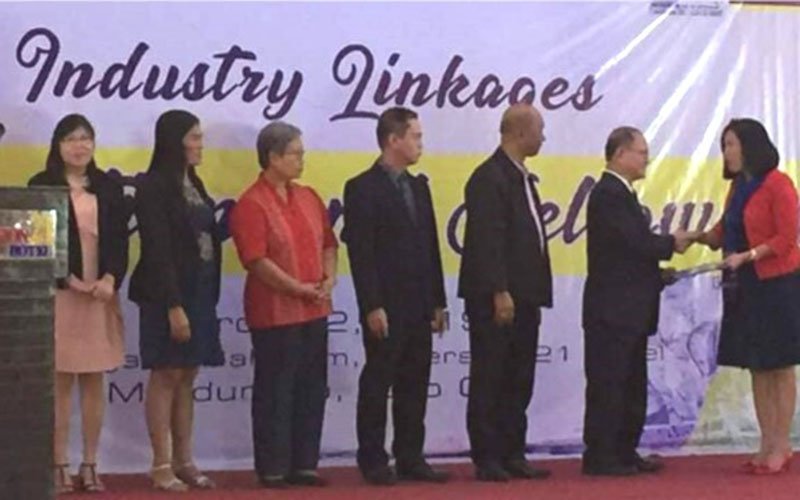
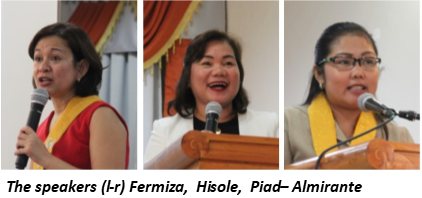 Empowered women can make change.
Empowered women can make change.